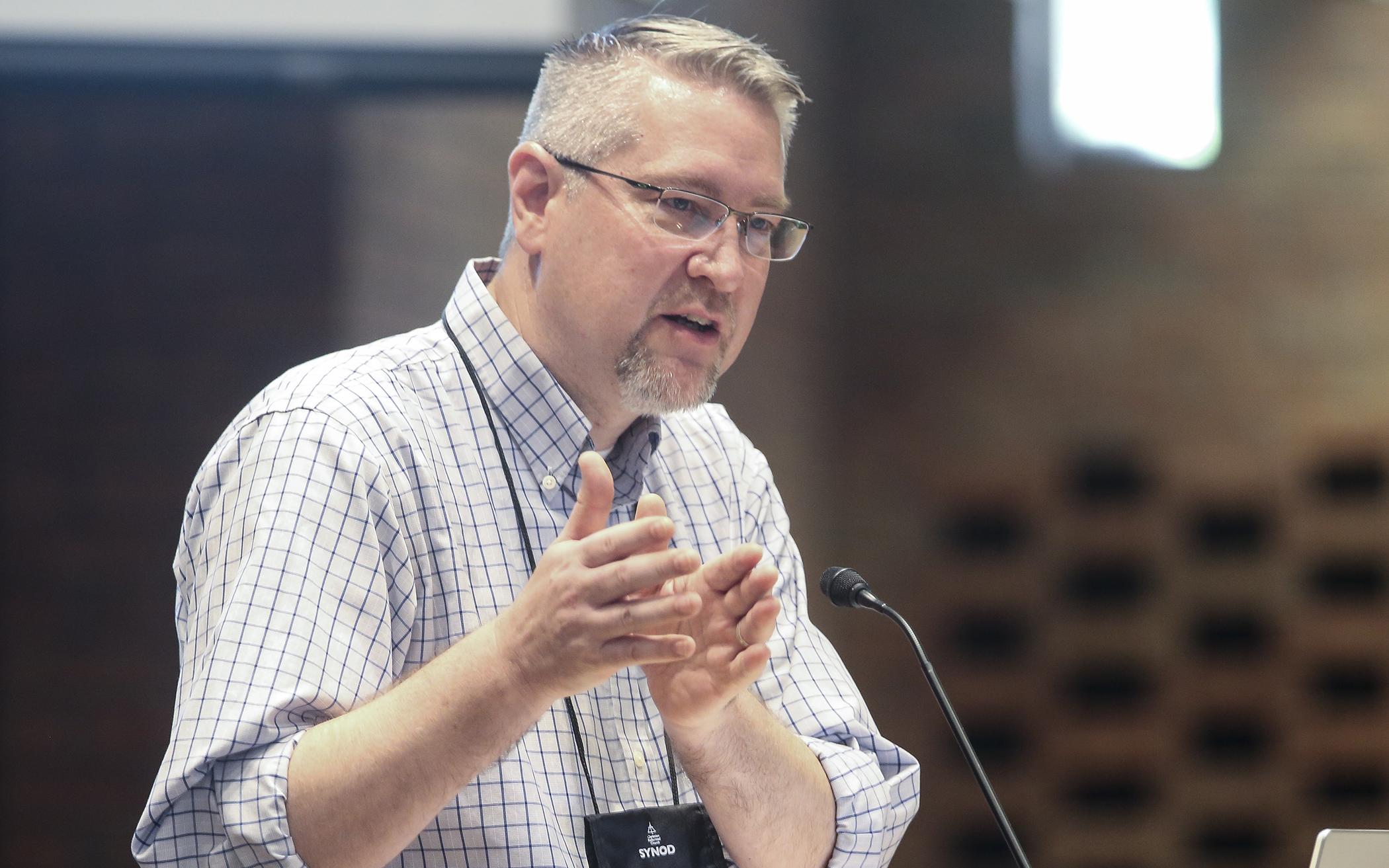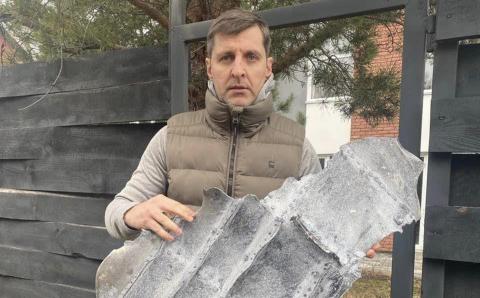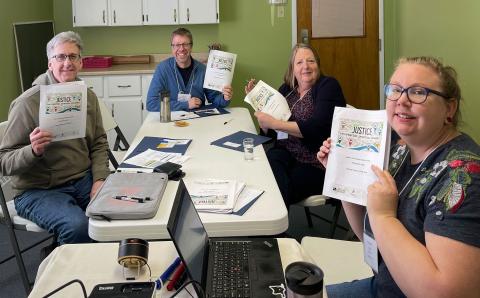After Synod 2023’s conversation about gravamina was cut short, Synod 2024 became responsible for providing clarity on when a gravamen should be used and how a church council should process it. The discussion over these matters took one evening and much of the next day's plenary sessions, and in the end synod adopted almost all of the advisory committee's recommendations, starting with affirming that “confessional-difficulty gravamina are not meant, nor should be used as an exception to the confessions.”
Synod is the annual general assembly of the Christian Reformed Church in North America. It is meeting June 14-20 in Grand Rapids, Mich.
Synod affirmed that first statement, with a vote of 137 to 47, after almost two and a half hours of discussion, with a full gallery of people watching in person and more on livestream. Seven delegates registered a negative vote.
Clarifying between two understandings
The committee proposing the statement believed it was a necessary clarification after observing two understandings within the CRC about the expected use of gravamina. In one understanding, “an officebearer uses a confessional-difficulty gravamen to express a personal difficulty to a council. The council would then judge whether they could tolerate the officebearer’s disagreement with the confessions. If so, the officebearer could continue to serve with the gravamen submitted to their local council,” the committee report said. In the other understanding, “the purpose of expressing the difficulty is to determine whether the officebearer’s gravamen is in line with the doctrines of our confessions, and if not, to help the officebearer pursue a path toward alignment—enlisting the help of the classis and synod if necessary.”
The committee said that both understandings have merit, and their report attempted to clarify for churches how to proceed. “Our intent is to provide a flexible and contextual plan of action while also clarifying the temporary nature of a confessional-difficulty gravamen,” the committee said.
Paul Verhoef, Classis Alberta South/Saskatchewan, spoke against the committee's first recommendation. He said, “I think for 48 years we’ve had assemblies that have tolerated officebearers with disagreement to the confessions, and it’s actually worked.” Verhoef said the report recognizes that “both of these ways (of understanding confessional-difficulty gravamina) have merit, and then you use the word ‘clarify.’ … I think what we’re going to do tonight is choosing” between the two understandings, not clarifying.
Jim Poelman, Classis Ontario Southwest was also against the recommendation to solidify what until now had two possible interpretations. He said that as a retired pastor, alongside his retired colleagues, “we can watch the dance that’s going on the floor, and it pains me to no end.” He added, “We’re going down an avenue where the church is becoming more divisive. … It's crippling us.”
Sherry TenClay, Classis Red Mesa, cautioned about adopting too firm a position. “We are a denomination of lifelong learners, and I can't imagine anybody to be set in cement enough to be fully 'settled'.” She said she worried about marrying the gravamina process with a specific concern—disagreement with Synod 2022's definition of “unchastity,” which was interpreted as confessional and therefore binding on officebearers. “If we aren’t careful we will create a systemic bias because we will remove all people from the conversation who do not agree with us,” TenClay said.
Discipleship, boundaries
Chad Werkhoven, Classis Minnkota, said, “A gravamen is not just a tool for discipline, it’s an opportunity for discipleship.” He spoke in favor of the no-exception statement. “These are not difficult doctrines, these are the core and the basis of our faith. How can we not delight in these things?”
Aaron Greydanus from Classis Heartland was also in favor of defining gravamina this way, saying, “These (the confessions) are our boundaries, and we are all called to work inside those boundaries and to call people outside the boundaries to repentance, and to come in.” Meanwhile, Ken Douma, Classis Alberta North, said, “We need boundaries, and we have them in the confessions, but there has to be room to wrestle and struggle.”
Ryan Schreiber, Classis Grand Rapids East, was against the definition. He reminded synod that prominent scholar Alvin Plantinga had a gravamen on reprobation. Schreiber said Plantinga “lifted theism on the world stage, and this is why people come to Calvin University.” With the new definition, Plantinga couldn’t be Christian Reformed, Schreiber said.
Patrick Anthony, Classis Central California, asserted that what makes one Christian Reformed is unwavering commitment to the confessions. His statement, “I'm more Christian Reformed than Alvin Plantinga” drew a surprised murmur from the floor and the galleries.
About halfway through the discussion, Lain Martinez, a young adult representative, asked for permission to sing a song. She sang, “Father lead us, give us peace of mind. Help us to be patient, gentle, and kind. Father lead us, let your will be done. No matter what happens, may we feel your love.” After this moment of worship, the discussion continued.
Douglas Fakkema, Classis Pacific Northwest, was in favor of the statement, saying, “Our council and classis are desperate for this process to help us to develop good officebearers in the church.” Mark Bonnes, Classis Northern Michigan, was against. He said, “It’s going to change how we wrestle with stuff, and I’m not convinced it changes it in a good way.”
After adopting that first statement, synod adjourned (an hour past the scheduled time) and returned to the committee’s work the next afternoon. Derek Buikema, president of Synod 2024, placed an hour limitation for the rest of the deliberations and limited speeches to two minutes, instead of three. He intentionally did not place restrictions on the length of the first conversation because “I wanted to take all the time to hear all the voices on this first point.”
Three-year time period
In the second set of discussions, synod passed recommendations to amend the Church Order supplement describing confessional-difficulty gravamina, to outline a structured process for resolution within a maximum three-year timeline, and to emphasize pastoral care and support throughout the process. The adopted changes to the Church Order Supplement take effect without needing to be ratified by a subsequent synod.
Hayden Regeling, Classis Hamilton, was in favor of the Church Order Supplement changes. “I want to continue to push this body and this denomination to keep thinking and praying about how we live out our confessionality in a way that is faithful to our theology, ecclesiology, and missiology.” He added, “I want to acknowledge that further confessional conversation needs to happen as we seek to be faithful and successful in guiding people into deeper relationship with God and the church.”
Some delegates expressed concern about the three-year time period, including Michelle Ellis, from Classis B.C. North-West. She shared about her experience growing up in a church where women did not serve in office, yet she felt a call to ministry: “For me to sort that out theologically took way longer than three years.” She added, “That wasn’t even confessional.” She said, “I’d really love to see that timeline remain at the discernment of the church councils.”
Andy Sytsma, Classis Yellowstone, chair of the committee, said the committee spent a long time trying to determine a timeline. He noted that three years aligns with deacon and elder terms and that they set a timeframe because “we wanted integrity in the process.” Another committee member, Nathan Dykstra, Classis Illiana, added, “We believed that this timeline was flexible enough for the local church to be able to do its work and care for its people pastorally.”
Sharing about his experience from when he wrestled with the doctrines of “perseverance of the saints and infant baptism,” when he was a young pastor, David Bosscher, Classis Thornapple Valley, said “I wish this had been clear for me when I needed it.” He could have approached his council with an expectation of how they would receive him. Instead he took his concerns to a friend.
Additionally, synod instructed “the Office of General Secretary to withdraw the Synod 2022 FAQ Questions 7-11 and develop a new FAQ statement in light of the decisions of Synod 2024.” There was no set timeline. Zachary King, General Secretary of the CRCNA, said, “We will ask for your grace as we prepare the FAQ and work towards some of the recommendations as we’re short-staffed.”
Process comes into effect now
For current officebearers with confessional difficulties, Synod 2024 resolved, “That synod instruct those who have submitted a confessional-difficulty gravamen that is still unresolved to use the process as outlined” in the changes to the supplement of Church Order Article 5.
Synod also instructed ongoing education on church confessions for members and officebearers, and directed denominational agencies to review and update their policies according to Synod 2024’s decisions.
The committee had one recommendation that did not pass. They asked Synod 2024 to defer Overture 42 (Agenda for Synod 2024, p. 518), a request from the council of Fourteenth Street CRC in Holland, Mich., to “create a category of ‘confessional-exception gravamen,’” because there wasn’t sufficient time to explore “the broader scope of Overture 42, (and) the church will be better served if Synod 2025 devotes time to examining it.”
Synod decided against that in a vote 79 to 101. “It relitigates everything we just did,” said Cory Nederveld, Classis Georgetown.
Instead, the overture received no specific response but was included with all the others that were addressed by the committee’s report: Overtures 49-51, 53-55, 58, 60, 62-64, Recommendation 1 of Overture 20, 22, 27, 35-43.
After voting on the different recommendations, synod clerks read recorded negative votes on several of the points of the report. (Because some of the recommendations were taken together and the record of negative votes were read at different times, the count of negative votes is not clear at the time of publication. All recorded negative votes will be in the Acts of Synod 2024.)
Synod 2024 is meeting June 14-20 at Calvin University in Grand Rapids, Mich. Find daily coverage from The Banner news team at thebanner.org/synod. Visit crcna.org/synod for the synod schedule, webcast, recordings, photos, committee reports, and liveblog. Synod is the annual general assembly of the Christian Reformed Church.
About the Author
Kristen Parker is a freelance writer. She has a passion for words and creativity. Kristen and her husband Chris, enjoy board games and thrift shopping. They attend Stratford CRC in Stratford, Ont.









